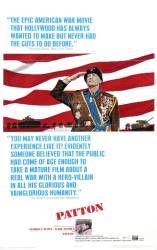Revealing mistake: Several maps of Europe shown in the film have Germany divided into East and West, and show national borders from 1945 onwards.
Revealing mistake: In the beginning of the movie when the child is trying to remove the ring from a dead American soldier it is obvious that he is pulling on the finger and not the ring.
Revealing mistake: In the scene where a child is seen stealing a ring from a dead soldier's finger, the soldier's arm is visibly moving and twitching.
Revealing mistake: When Patton is inspecting the barracks at the beginning of the movie he swipes a picture of a "calendar girl" off the wall. If you look there are a number of scrapes already on the wall. There were obviously a number of retakes.
Revealing mistake: In Patton's office with Generals Truscott and Bradley, Patton lies down on a bench which is almost in the middle of the room when showing all three officers. However, the closeups of Patton lying on the couch shows the couch up close to a wall.






Answer: Very accurate, almost spot on, as veterans who served under him during WW2 would attest after seeing the film "Patton." The real life difference between actor George C. Scott and the real General Patton was his voice- unlike the gravel voice that Scott possessed, Patton had a high voice that would get higher the angrier he got.
Scott215